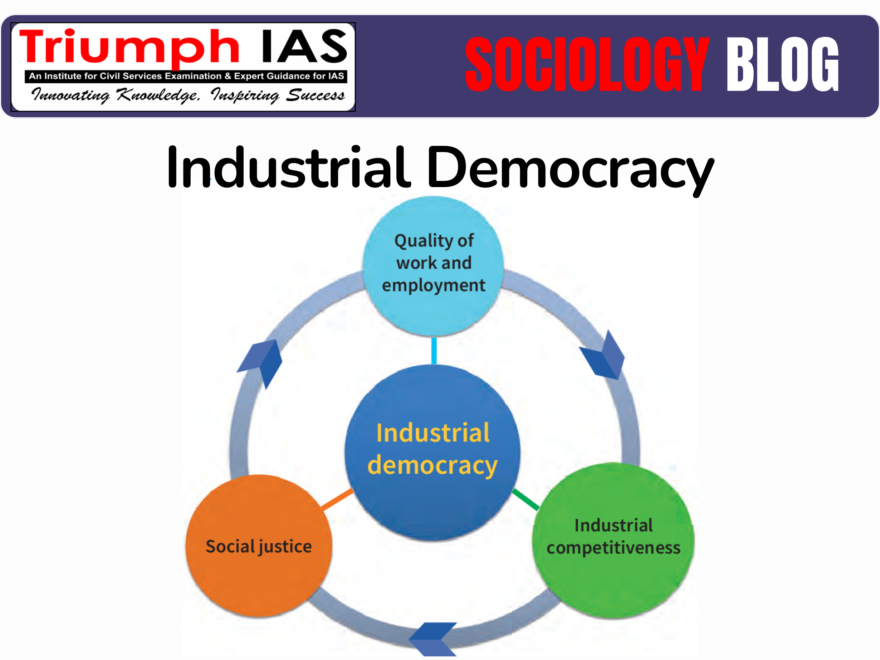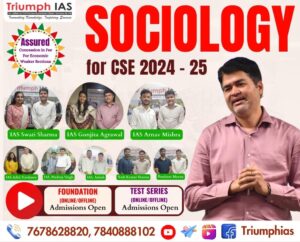Industrial Democracy
Relevant for Sociology Optional for Civil Service Examination.
Relevance : Sociology Paper -1 , Unit 6- Work & Economic Life
Industrial Democracy
Industrial democracy is an arrangement that involves workers making decisions, sharing responsibility, and having authority in the workplace.
Some key principles of industrial democracy include:
-
- Workers’ control: Industrial democracy emphasizes the importance of workers having control over the conditions of their work and their broader rights as citizens.
- Co-determination: This concept, often associated with German companies, involves workers having equal representation on the supervisory boards of directors, which are responsible for organizational design and hierarchy.
- Participatory management: Workers are encouraged to take part in decision-making processes and contribute to the organization’s direction.
- Labor-management cooperation: Industrial democracy promotes collaboration between management and labor to improve the quality of products, work-life, and the effectiveness of companies.
- Collective bargaining: Workers have the right to negotiate collectively to protect their interests and define what it means to be an American, as opposed to the ideas emanating from employers or industrial capitalists.
- Employee representation: Industrial democracy includes various programs and structures that provide workers with a voice in the workplace, such as works councils, shop committees, and other employer-employee cooperative efforts.
THINKERS VIEWPOINT ON INDUSTRIAL DEMOCRACY
-
- Peter Drucker: Introduced principles of industrial democracy such as Management by Objectives, decentralization of work, knowledge-based work, and SMART goals.
- Ralph Dahrendorf: Advocated for a larger role of worker interest groups in the day-to-day activities of management in modern society.
- Ralph Miliband: Argued that strikes are a temporary form of protest and are calculative in nature.
- Philip Slater and Warren Bennis: Suggested that while democracy is a nice way of life, it is a luxurious and costly principle of management.
- Harry Braverman: In his work “Labor and Monopoly Capital, 1974,” argued that Fordism and automation led to the ‘deskilling’ of the labor force, as workers lost control over their skills due to specialized production.
- Michael Burawoy: Rejected Marx’s explanation of workers working hard due to coercion, asserting that with the rise of labor unions and reforms, the arbitrary power of management was substantially abolished. Workers, to some extent, give their consent to working hard under the capitalist system.
- Post-Fordism era: Highlighted a renewed focus on customized products, increased workplace flexibility, and a greater differentiation of work tasks.
Reference: Static Portion
Related Blogs…
Frequently Asked Questions:
1. Question: Define the term “ethnic movement” and provide an example from India.
Answer: An ethnic movement refers to a collective effort by a group sharing common cultural, linguistic, or religious traits, seeking to assert their identity and rights; an example from India is the Khalistan Movement in Punjab.
2. Question: Identify the main objectives behind the Gorkhaland ethnic movement.
Answer: The Gorkhaland ethnic movement primarily seeks to establish a separate state for India’s Nepali-speaking population in the Darjeeling region, advocating for linguistic and cultural recognition and political autonomy.
3. Question: What was the Operation Blue Star, and which ethnic movement was it related to?
Answer: Operation Blue Star was a military action in 1984, aiming to remove Sikh militants hiding in the Golden Temple in Amritsar; it is related to the Khalistan movement, which sought a separate Sikh country.
4. Question: Mention a critical factor that triggered the emergence of ethnic movements in India, as discussed by Dipankar Gupta.
Answer: Dipankar Gupta emphasized that ethnicity is fundamentally a political process, wherein caste and religion, the key components of identity formation, are politicized by leaders for vested interests.
5. Question: What were the primary reasons for the Assam Ethnicity conflicts involving Bodo tribals and Bengali Muslim settlers?
Answer: The Assam Ethnicity conflicts primarily stemmed from issues related to immigration, land rights, and resource allocation, leading to clashes, riots, and evolving relationships among indigenous communities to address challenges.
6. Question: Briefly describe the role of the Dravidian Movement in terms of caste and societal structure.
Answer: The Dravidian Movement, led notably by E.V. Ramasamy, aimed to establish an egalitarian society, focusing on anti-Brahmanism and advocating for equal rights for backward castes, while also introducing reforms like self-respect marriages.
7. Question: Name the prominent ethnic movements in North-East India and specify one common objective.
Answer: Prominent ethnic movements in North-East India include the Nagas’ and Mizos’ struggles; a common objective was to gain autonomy and recognition for their distinct tribal identities and cultural uniqueness.
8. Question: What is the key argument of Gail Omveldt regarding traditional Indian society and multiculturalism?
Answer: Gail Omveldt opposed romanticizing traditional Indian society, arguing that hierarchy has always dominated it and dismissing the notion that multiculturalism is an intrinsic feature of Indian society as a myth.
9. Question: Briefly explain the social hierarchy factor as a contributing element to ethnic movements as suggested by Olzak.
Answer: Olzak suggests that the construction of hierarchies among ethnic communities, which often leads to the suppression of one group by another, is a key factor that can instigate social and ethnic movements.
10. Question: Identify one consequence of the unequal economic development factor within the context of ethnic movements in India.
Answer: One consequence of unequal economic development is the marginalization and underdevelopment of certain groups, leading to feelings of alienation and sometimes initiating ethnic movements as these groups strive for equality and recognition.
GS Related Practices Questions…
To master these intricacies and fare well in the Sociology Optional Syllabus, aspiring sociologists might benefit from guidance by the Best Sociology Optional Teacher and participation in the Best Sociology Optional Coaching. These avenues provide comprehensive assistance, ensuring a solid understanding of sociology’s diverse methodologies and techniques.
META TAGS:
Ethnic Movements, ethnic movements in india, ethnic movement in sociology, Punjab Movement, North-East Ethnic Movements, Gorkhaland Movement, Dravidian Movement, Assam Ethnicity, Ethnic Conflicts, Sociopolitical Impact, India, Ethnic Consciousness, Ethnic Rights, Political Crisis, Economic Development, Cultural Disparities, Khalistan Movement, Nagaland, Mizoram, Multiculturalism, Political Economy, Identity Formation, Social Hierarchies, Bodo Tribals, Bengali Muslim Settlers, Anti-Sikh Riots, Operation Blue Star, Unequal Development, Ethnic Violence, Political Mobilization
Why Vikash Ranjan’s Classes for Sociology?
Proper guidance and assistance are required to learn the skill of interlinking current happenings with the conventional topics. VIKASH RANJAN SIR at TRIUMPH IAS guides students according to the Recent Trends of UPSC, making him the Best Sociology Teacher for Sociology Optional UPSC.
At Triumph IAS, the Best Sociology Optional Coaching platform, we not only provide the best study material and applied classes for Sociology for IAS but also conduct regular assignments and class tests to assess candidates’ writing skills and understanding of the subject.
Choose The Best Sociology Optional Teacher for IAS Preparation?
At the beginning of the journey for Civil Services Examination preparation, many students face a pivotal decision – selecting their optional subject. Questions such as “which optional subject is the best?” and “which optional subject is the most scoring?” frequently come to mind. Choosing the right optional subject, like choosing the best sociology optional teacher, is a subjective yet vital step that requires a thoughtful decision based on facts. A misstep in this crucial decision can indeed prove disastrous.
Ever since the exam pattern was revamped in 2013, the UPSC has eliminated the need for a second optional subject. Now, candidates have to choose only one optional subject for the UPSC Mains, which has two papers of 250 marks each. One of the compelling choices for many has been the sociology optional. However, it’s strongly advised to decide on your optional subject for mains well ahead of time to get sufficient time to complete the syllabus. After all, most students score similarly in General Studies Papers; it’s the score in the optional subject & essay that contributes significantly to the final selection.
“A sound strategy does not rely solely on the popular
Opinion of toppers or famous YouTubers cum teachers.”
It requires understanding one’s ability, interest, and the relevance of the subject, not just for the exam but also for life in general. Hence, when selecting the best sociology teacher, one must consider the usefulness of sociology optional coaching in General Studies, Essay, and Personality Test.
The choice of the optional subject should be based on objective criteria, such as the nature, scope, and size of the syllabus, uniformity and stability in the question pattern, relevance of the syllabic content in daily life in society, and the availability of study material and guidance. For example, choosing the best sociology optional coaching can ensure access to top-quality study materials and experienced teachers. Always remember, the approach of the UPSC optional subject differs from your academic studies of subjects. Therefore, before settling for sociology optional, you need to analyze the syllabus, previous years’ pattern, subject requirements (be it ideal, visionary, numerical, conceptual theoretical), and your comfort level with the subject.
This decision marks a critical point in your UPSC – CSE journey, potentially determining your success in a career in IAS/Civil Services. Therefore, it’s crucial to choose wisely, whether it’s the optional subject or the best sociology optional teacher. Always base your decision on accurate facts, and never let your emotional biases guide your choices. After all, the search for the best sociology optional coaching is about finding the perfect fit for your unique academic needs and aspirations.
To master these intricacies and fare well in the Sociology Optional Syllabus, aspiring sociologists might benefit from guidance by the Best Sociology Optional Teacher and participation in the Best Sociology Optional Coaching. These avenues provide comprehensive assistance, ensuring a solid understanding of sociology’s diverse methodologies and techniques. Sociology, Social theory, Best Sociology Optional Teacher, Best Sociology Optional Coaching, Sociology Optional Syllabus.
Best Sociology Optional Teacher, Sociology Syllabus, Sociology Optional, Sociology Optional Coaching, Best Sociology Optional Coaching, Best Sociology Teacher, Sociology Course, Sociology Teacher, Sociology Foundation, Sociology Foundation Course, Sociology Optional UPSC, Sociology for IAS,
Follow us :
🔎 https://www.instagram.com/triumphias
🔎https://www.youtube.com/c/TriumphIAS
🔎https://t.me/VikashRanjanSociology
Find More Blogs…
| Compare and contrast Karl Marx’s and Max weber’s | Karl Marx- Historical Materialism |
| Talcott Parsons : Social system | Scope of the subject and comparison with other social sciences |
KEYWORD: Industrial Democracy,Industrial Democracy,Industrial Democracy,Industrial Democracy,Industrial Democracy,Industrial Democracy,Industrial Democracy,Industrial Democracy,Industrial Democracy,Industrial Democracy,Industrial Democracy,Industrial Democracy,Industrial Democracy,Industrial Democracy,Industrial Democracy,Industrial Democracy,Industrial Democracy,Industrial Democracy,Industrial Democracy,Industrial Democracy,Industrial Democracy,Industrial Democracy,Industrial Democracy,Industrial Democracy,Industrial Democracy,Industrial Democracy,


